Ask a question from expert
Assignment on Diploma in Business
28 Pages8619 Words152 Views
Added on 2021-03-22
Assignment on Diploma in Business
Added on 2021-03-22
BookmarkShareRelated Documents
1 ASSIGNMENT 1 FRONT SHEET Qualification BTEC Level 5 HND Diploma in Business Unit number and title Unit 11: Research Project Submission date 04/02/2020 Date Received 1stsubmission04/02/2020 Re-submission DateDate Received 2ndsubmissionStudent Name Cao Phuong Linh Student ID GBH190801 Class GBH0809 Assessor name Hoang Thi Lan Anh Student declaration I certify that the assignment submission is entirely my own work and I fully understand the consequences of plagiarism. I understand that making a false declaration is a form of malpractice. Student’s signature linh Grading grid P1 P2 M1
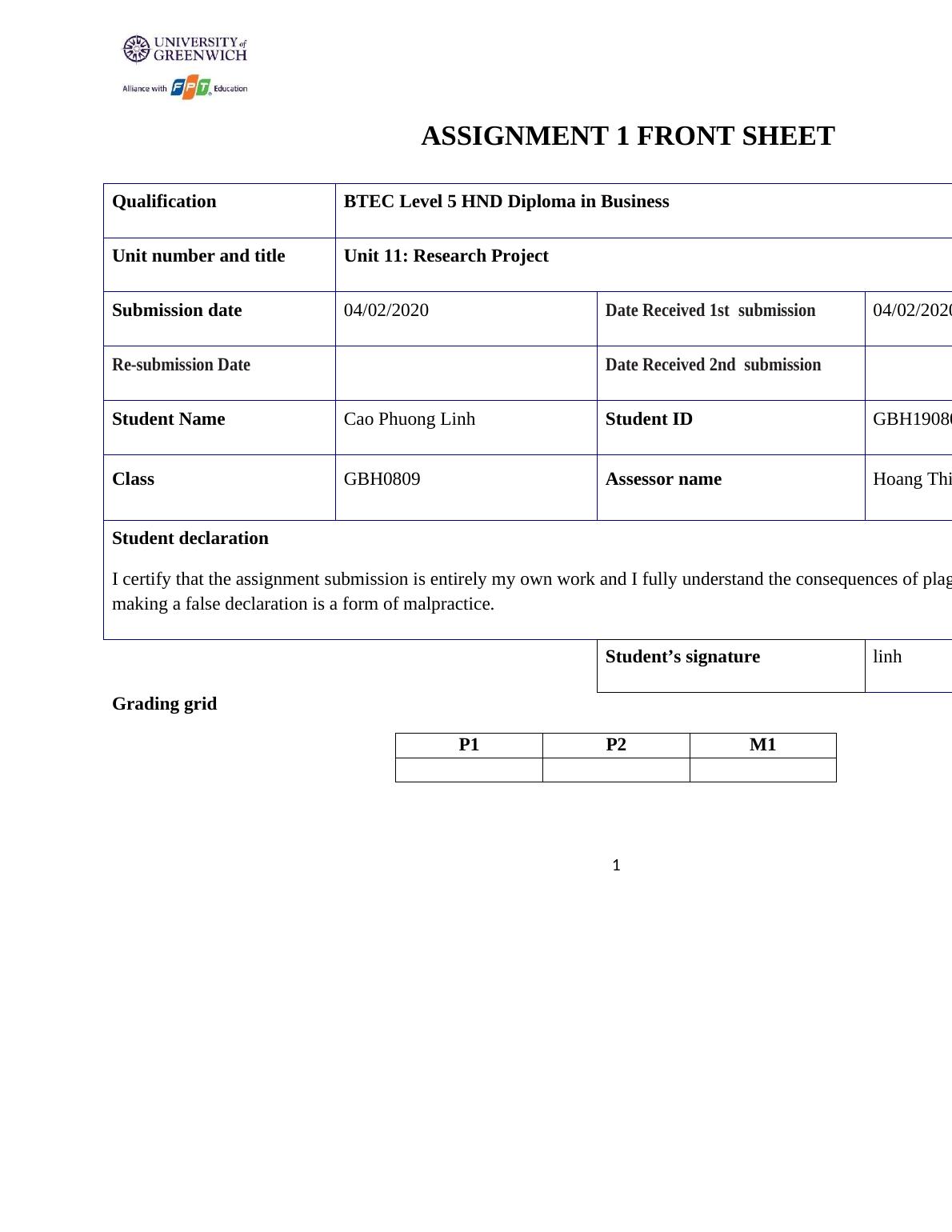
2 Summative Feedback: ResubmissionFeedback:Grade:Assessor Signature:Date:Internal Verifier’s Comments:Signature & Date:
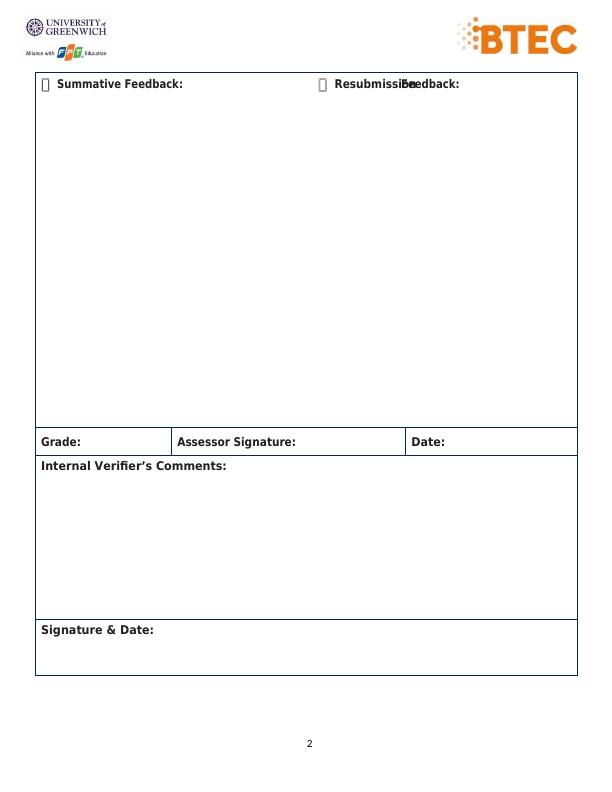
3 Table of Contents RESEARCH PROPOSAL FORM .................................................................................................................................................... 4 Section One: Title, objective, responsibilities ...................................................................................................................... 4 Section Two: Reasons for choosing this research project .................................................................................................... 4 Section Three: Literature sources searched ......................................................................................................................... 4 1.Employer Reputation ................................................................................................................................................. 4 1.1Definition of Employer Reputation ....................................................................................................................... 4 1.2Factors/components of Employer Reputation: definition ................................................................................... 6 1.3Impacts of Employer Reputation on employees and potenial candidates .......................................................... 7 2.Talent management .................................................................................................................................................. 9 2.1Talent definition .................................................................................................................................................... 9 2.2Talent management process ............................................................................................................................... 10 2.3Talent acquisition definition and methods ......................................................................................................... 13 3.Gaps in the literature review .................................................................................................................................. 15 Section Four: Activities and timescales .............................................................................................................................. 17 Section Five: Research approach and methodologies........................................................................................................ 18 RESEARCH ETHICS FORM ......................................................................................................................................................... 19 REFERENCES ............................................................................................................................................................................. 25
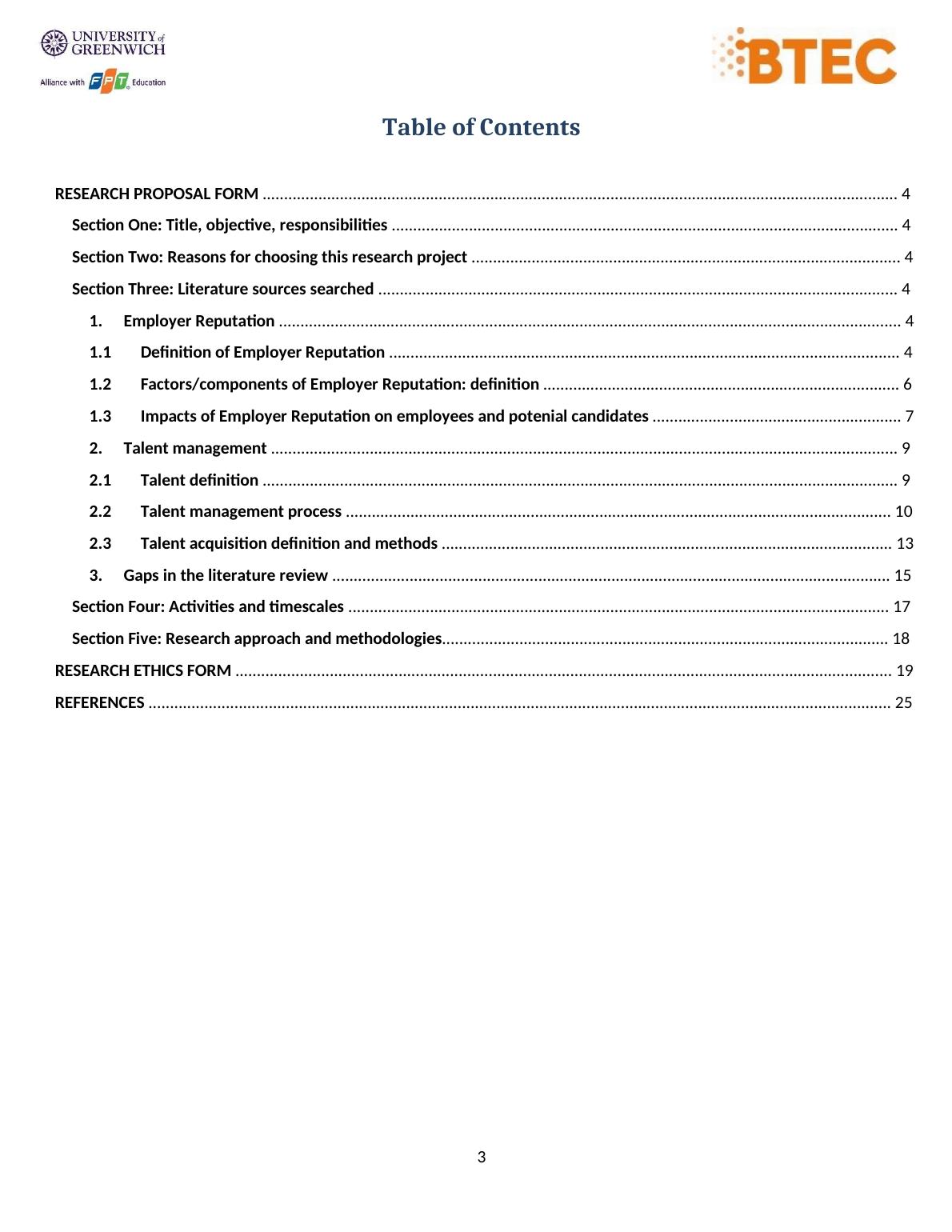
4 RESEARCH PROPOSAL FORM Section One: Title, objective, responsibilitiesIn the current corporate context, talent management is a dilemma that any company is facing. This research will enable companies to build talent networks and deal with shortages of high-quality workers. With the big theme "Talent Management", the title of this small project is about Employer Reputation and in order to answer the research question is “What are impacts of Employer Reputation on talent’s application decision?”. The objective of this research project is to find out how an employer's reputation influences talent recruitment decisions. Section Two: Reasons for choosing this research project There are two main reasons for me to choose this project for my research. First, when I decided to research this project, I thought this topic was essential for a young graduate like me to choose the right company for me. And I also want to find out why the reputation of an employer like Deloitte attracts so much talent. Thereby, I can find a position for myself at each stage of developing my own orientation. The other reason I chose this topic is because it combines from Human Resource Management course, which I have studied before to give me a more comprehensive view of how to manage human resources and especially how to manage talent in a company or a large organization. Section Three: Literature sources searched 1.Employer Reputation In the search for an employer's reputation, the following 3 parts investigate the reputation of employers in depth. Firstly, an employer's reputation must be established in compliance with current research papers. The factors and components of employer's reputation are thus identified. The final segment discusses the impacts of Employer Reputation on employees and potenial candidates. 1.1Definition of Employer Reputation In a growing number of academic studies in management literature, the concept of employer reputation, at once simple and complex, plays a central role. Reputation is focused on previous behavior and associations of
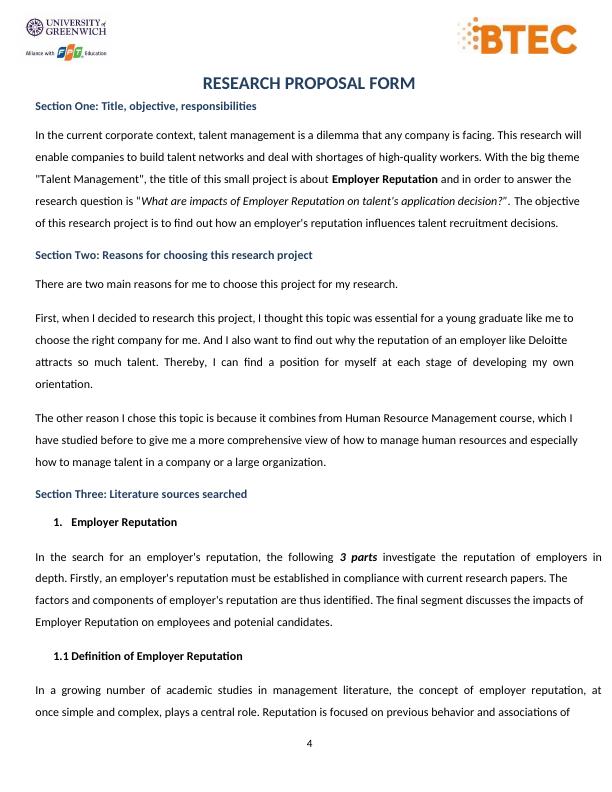
5 the organization, but it can be suddenly altered as fresh details about past activities of the company becomes apparent or when observers find out about current behavior or associations of the company (Lange, Lee and Dai, 2010). The employer reputation is also known as the reputation of the organization or the reputation of a corporation or business. There are 3 main concepts of employer reputation, based on Organizational Reputation: A Review of Donald Lange & Peggy M. Lee, belonged to Arizona State University and Ye Dai in University of Texas–Austin, was written in January in 2011. In a number of published research in management literature, one definition of employer reputation can be illustrated by the concept that reputation can be simply to be well known. This conceptualization is also a component of multidimensional frames of definition by Rindova et al (2005). This dimension is defined by Rindova et al (2005) as 'prominence' and it is suggested that the degree to which an organization is widely recognized among stakeholders in its field of organization and its outstanding role in relation to its competitors is a significant element in the reputation of employer. In a similar direction, the company reputation by Saxton and Dollinger (2005) refers to "brand name". If a company is well known, observes have a good understanding of its core qualities, especially compare to other businesses. A second conceptualisation of the reputation of the employer is that reputation means that the business has a special benefit or merit attribute to the perceiver. This definition is also part of multidimensional description structures which is researched by Fischer and Reuber (2007), Love and Kraatz (2009), and Rindova et al (2005). The study states that the reputation "is an evaluation of a specific characteristics or attribute" according to Fischer and Reuber (2007). For instance, a business is regarded as an aggressive predator for price or for selling better products. Rindova et al also explored the word "quality perceived quality" in 2005. The terms "perceived quality" imply the degree to which the parties involved measure a business favorably on its basic attributes, such as the ability to deliver products of quality. In this type of concept, Rhee and Haunschild (2006) also describes reputation as "a subjective evaluation in consumer quality perceived by the producer" as the concept known for something conceptualization. Bergh, Ketchen, Boyd, and Bergh (2010) state that "the reputation of a group of companies is geared to understanding differences in product quality". Therefore, Deutsch and Ross (2003) proclaim in this vein is that companies will
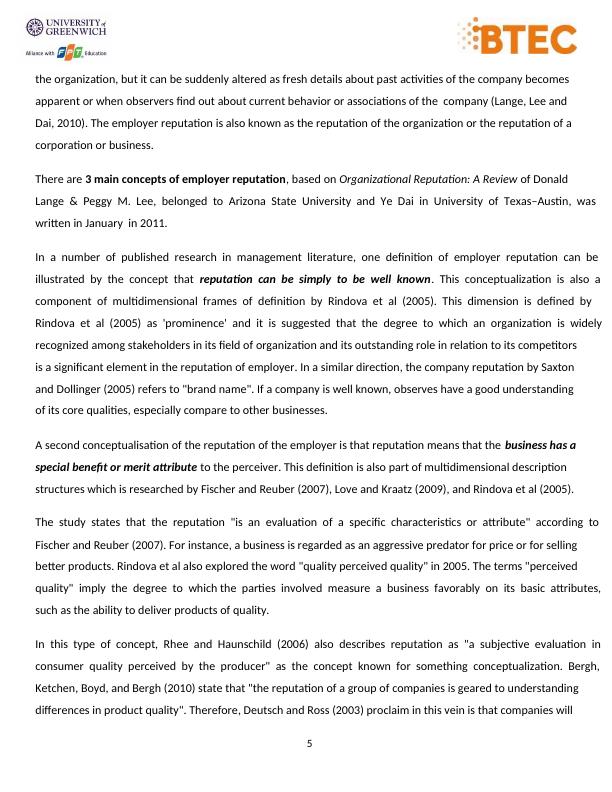
6 build reputations for many things about which many others are concerned. For example, a company is recognized for its management efficiency, product or service quality, environmental and Community responsibility, innovation and the soundness about financial. The third conception of the reputation is a general appraisal of the organisation's favorability character, including "appreciation, consideration of the company's placement and the company's appeal" (Barnett, Jermier and Lafferty, 2006). This concept is also one aspect of Fischer and Reuber's multidimensional description structures in 2007. Contrary to the second concept, the abstract conceptualization of favorability means impression assumptions about the business which are focused on various organizational characteristics rather than on perceptions of particular organizational outcomes of a given audience. Considering that, under the established conceptualisation, constituencies look the business to suit their own unique needs (e.g. environmental performance), the perceivors consider that the overall company is more or less decent and appealing under the general favorable conceptualisation. As the other aspects of the corporate credibility, reputation metrics in the general dimension of favorability depend strongly on whether public researchers or practitioners wish to examine. The three main concepts of an employer's reputation are discussed in the above three sections based on the word "reputation". Although there are many research papers on employer reputation, the other three main concepts have somewhat covered every aspect when understanding its definition. 1.2Factors/components of Employer Reputation: definition These elements are also considered employer reputation measures. Lloyd and Mortimer (2006) are the six core components of corporate reputation to describe performance, identity, image, brand, management and ethical leadership. In his analysis, Schwaiger (2004), however, defined precisely ten components of employer reputation in terms of components and parameters. The following parts are part of these factors. The first is the “quality of the workers”, which lies in the quality of workforce companies hiring. The next aspect is the “depth of motivation and talents” which prove that they are handled and the nature of their job behaviour, which is integrated into the public domain, and which therefore influences their reputation or
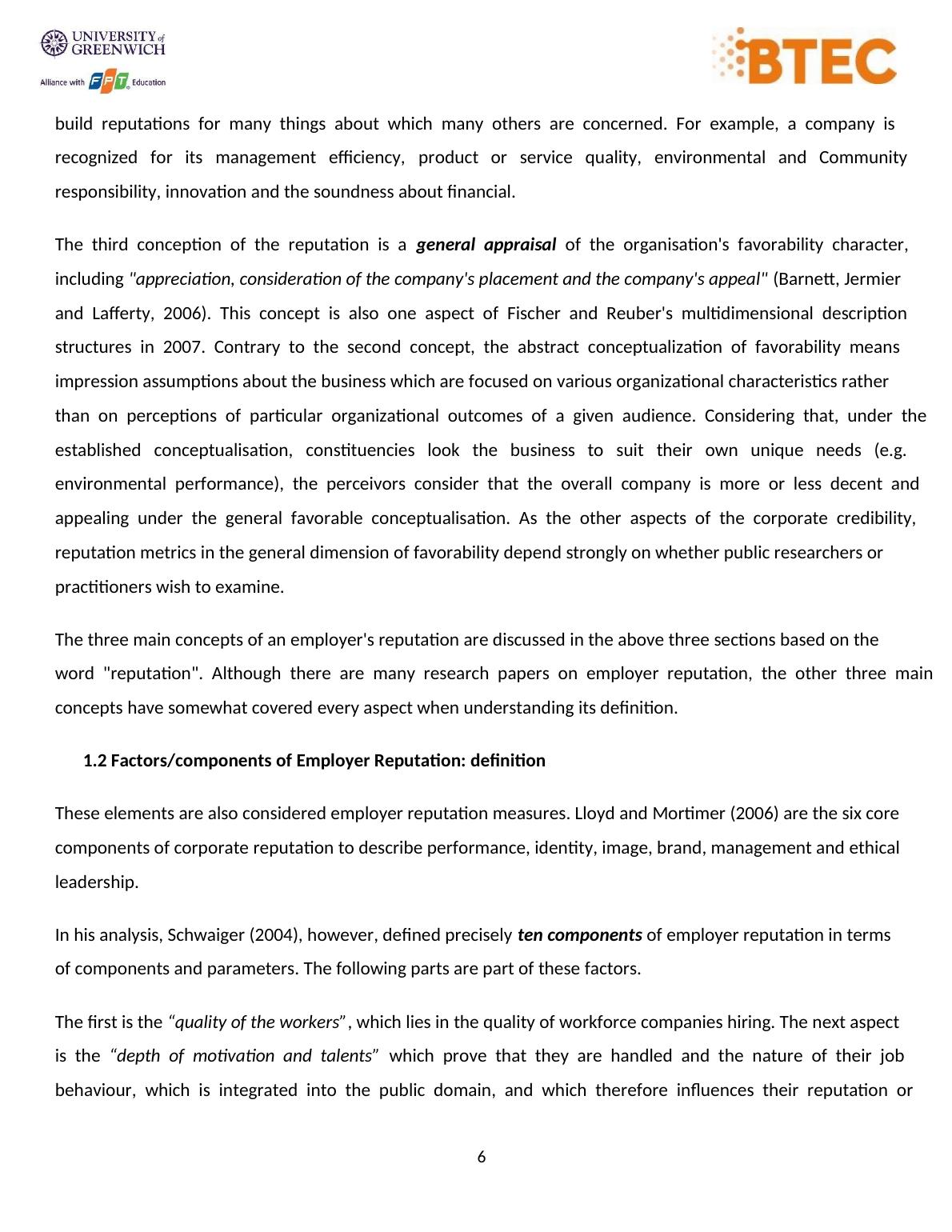
End of preview
Want to access all the pages? Upload your documents or become a member.
Related Documents
Unit 13:Computing Research Projectlg...
|15
|5476
|646
Unit 4: Management and Operations (488)lg...
|42
|14569
|324
Unit 31: Statistics for management Assignmentlg...
|30
|9399
|71
Unit 09 : Entrepreneurship & Small Business Managementlg...
|27
|10477
|73
Unit 06: Managing a Successful Business Project.lg...
|13
|3196
|37
Student declaration I certify that this assignment submission is entirely my own work and that I understand the consequences of plagialg...
|41
|9732
|12